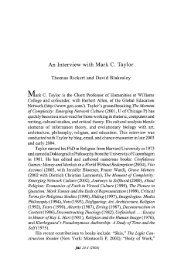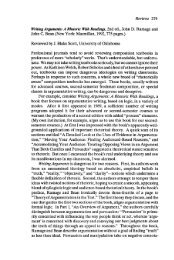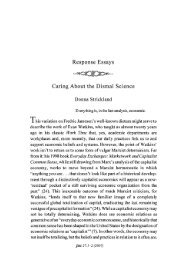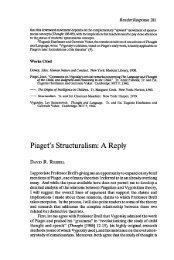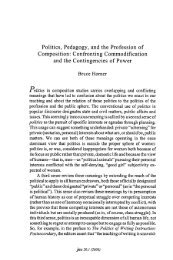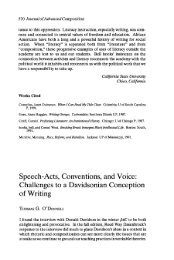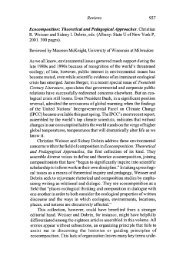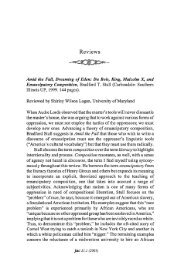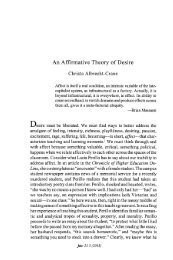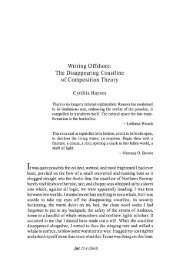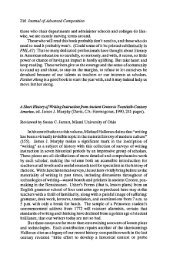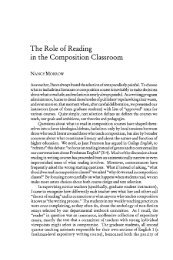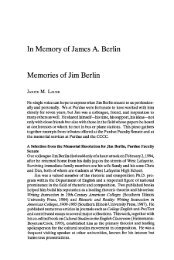Nance Van Winckel Pausing, or the act of reflection ... - JAC Online
Nance Van Winckel Pausing, or the act of reflection ... - JAC Online
Nance Van Winckel Pausing, or the act of reflection ... - JAC Online
You also want an ePaper? Increase the reach of your titles
YUMPU automatically turns print PDFs into web optimized ePapers that Google loves.
<strong>Nance</strong> <strong>Van</strong> <strong>Winckel</strong> 111<br />
state <strong>of</strong> remaining in between. It is no doubt because we can<br />
remain at this kind <strong>of</strong> equilibrium that we are able, as Flower and<br />
Hayes say, to "juggle" those complex constraints writing demands.<br />
And perhaps we may even discover fur<strong>the</strong>r that <strong>the</strong> better<br />
one's balance in this sense, <strong>the</strong> m<strong>or</strong>e constraints one can juggle,<br />
and <strong>the</strong> m<strong>or</strong>e smoothly.<br />
This <strong>the</strong><strong>or</strong>y <strong>of</strong> preconsciousness as <strong>the</strong> balance point between<br />
<strong>the</strong> brains-<strong>the</strong> kind <strong>of</strong> thinking I'm suggesting accounts<br />
f<strong>or</strong> much <strong>of</strong> <strong>the</strong> time spent pausing-differs from earlier <strong>the</strong><strong>or</strong>ies<br />
<strong>of</strong> brain hemispheric functions during composing. Until recently<br />
it was assumed that we simply needed to teach students, if such<br />
a thing is possible, to w<strong>or</strong>k m<strong>or</strong>e in one brain <strong>or</strong> <strong>the</strong> o<strong>the</strong>r. This<br />
notion was based on <strong>the</strong> belief that we simply leap from one<br />
brain to <strong>the</strong> o<strong>the</strong>r as we compose. Much <strong>of</strong> this mistaken emphasis<br />
on brain lateralization <strong>of</strong> "hemisphericity" may be explained<br />
as <strong>the</strong> result <strong>of</strong> <strong>the</strong> nature <strong>of</strong> early brain research. Since<br />
most <strong>of</strong> those early experiments were perf<strong>or</strong>med exclusively on<br />
patients who had had one hemisphere <strong>or</strong> <strong>the</strong> o<strong>the</strong>r removed, <strong>or</strong><br />
had had <strong>the</strong>m surgically separated, naturally one brain hemisphere<br />
<strong>or</strong> <strong>the</strong> o<strong>the</strong>r could be shown to "dominate."<br />
The confluence <strong>of</strong> left and right brain thinking that researchers<br />
now believe occurs in preconsciousness is, I think, a<br />
subject that deserves and is receiving closer scrutiny, and such researchers'<br />
findings may soon give us m<strong>or</strong>e explicit inf<strong>or</strong>mation<br />
about what <strong>act</strong>ually goes on as a writer pauses.<br />
It is most helpful, too, to understand this idea <strong>of</strong> one's<br />
"thinking" rhythm in <strong>the</strong> larger context <strong>of</strong> one's "thinkingwriting"<br />
rhythm. Sondra Perl concludes in one protocol study,<br />
f<strong>or</strong> instance, that students' over-concern f<strong>or</strong> c<strong>or</strong>rect w<strong>or</strong>king and<br />
mechanics "interrupts so <strong>of</strong>ten and to such a degree that it<br />
breaks down <strong>the</strong> rhythm generated by writing. When this happens,<br />
students are f<strong>or</strong>ced to go back and recapture <strong>the</strong> strands <strong>of</strong><br />
<strong>the</strong>ir thinking once <strong>the</strong> editing operation has been completed."2 4<br />
Such a premature concern f<strong>or</strong> editing, <strong>the</strong>n, seems to undermine<br />
a student's ability to remain focused on what he <strong>or</strong> she is trying<br />
to write, which undoubtedly accounts f<strong>or</strong> many beginning<br />
student writers' frustrations with writing.<br />
This thinking-writing rhythm, though naturally not <strong>the</strong>



